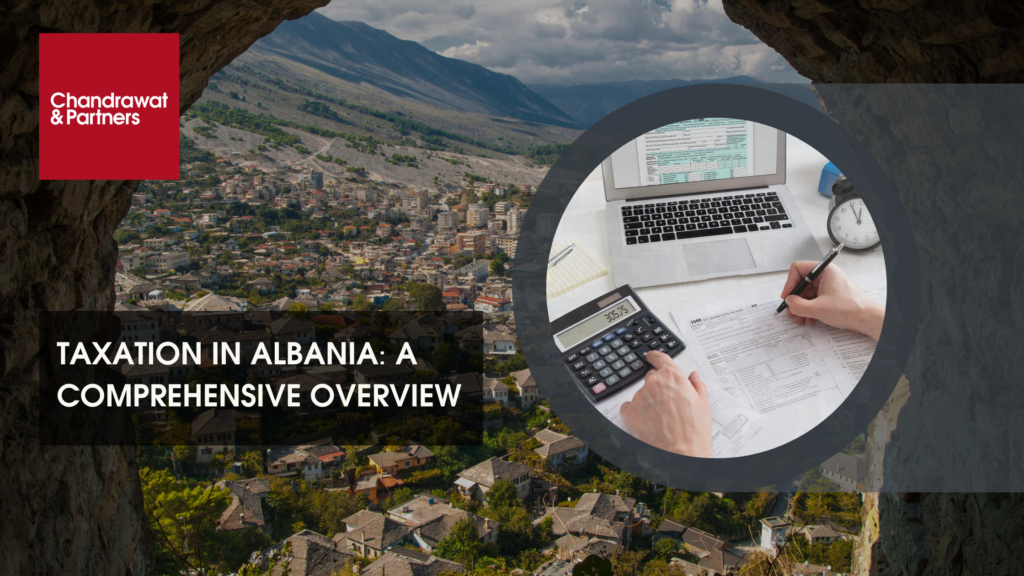We have a team of professionals to help you with all your business needs. So, that you can focus on business expansion in Albania.
Please feel free to email us on enquiries@chandrawatpartners.com
Albania
Why Albania?
Albania, a compact but quickly growing nation in Southeast Europe, has a variety of chances for companies wishing to grow their operations. The workforce is energetic and well-educated, the market for many goods and services is expanding, and the legal system is typically favorable to international businesses. With a concentration on the industry, technology, and renewable energy, Albania’s economy is also expanding quickly. With businesses like General Electric, Coca-Cola, and Vodafone opening offices in Albania, the nation has made tremendous strides in recent years in luring international investment.
Advantages
There are several advantages to doing business in Albania, including:
Strategic location
Southeast European-based Albania serves as a key entryway between the Balkans, the Middle East, and the Mediterranean.
Growing economy
In recent years, Albania’s economy has been expanding significantly, with a concentration on sectors like tourism, agriculture, and energy.
Low labor costs
As compared to other European nations, Albania has a comparatively cheap cost of labor, which can help firms save operating expenses.
Access to the skilled workforce
The labor force in Albania is educated and talented, especially in industries like engineering, technology, and healthcare.
Business-friendly environment
The Albanian government has taken steps to enhance the economic climate of the nation, including cutting red tape, streamlining tax regulations, and enacting pro-business legislation.
Simple Tax Regime
Individual tax
Individual taxpayers are liable to personal income tax, including residents and non-residents. Albanian law follows the idea of global taxation. Those who are residents are subject to tax on all sources of income, both inside and outside of Albania’s borders, while non-residents are only subject to tax on income earned within the country’s borders.
The following tax rates apply to income generated from employment:
1 January to 30 June 2022
- Income from 0 to 30,000 Albanian leks “ALL” is liable to tax at the rate of 0%;
- Income from 30,001 to 150,000 Albanian leks “ALL” is liable to tax at the rate of 13%;
- Income over 150,001 Albanian leks “ALL” is liable to tax at the rate of 23%.
1 July to 31 December 2022
- Income from 0 to 40,000 Albanian leks “ALL” is liable to tax at the rate of 0%;
- Income from 40,001 to 50,000 “ALL” is liable to tax at the rate of 6.5%;
- Income over 50,000 “ALL” is liable to tax at the rate of 13%;
- Income other than from employment is 15% (8% for dividends).
Corporate tax
Albanian law follows the idea of global taxation. Whereas non-resident entities are only subject to taxation on revenue earned within Albanian territory, resident entities are subject to taxation on all sources of income both within and outside the country.
Albania has a 15% corporate income tax “CIT” rate. The taxable profits—calculated as taxable income less deductible expenses—are subject to CIT.
Taxpayers having a taxable income of up to 14 million Albanian leks “ALL” per year are free from CIT, whereas those with a taxable income beyond 14 million ALL per year must pay 15% CIT.
Taxpayers, however, are charged a 5% CIT if their activity includes the creation and manufacturing of software. Taxpayers are also liable to a 5% CIT if their activity is based on agricultural cooperation or if it is recognized as “agro-tourism” under the relevant rules.
Albania Companies
General Partnerships
A business is a general partnership if it is incorporated as such, operates under a common name, and each member has limitless responsibility to debtors.
Limited Partnerships
When the responsibility of at least one partner (the limited partner) is restricted to the value of his stake while the liability of the other partners is unrestricted, the partnership is deemed to be a limited partnership. In a general partnership, general partners have the same rights as other partners.
Limited Liability Companies
A limited liability company is a business entity established by natural or legal people, each of whose liability for the company’s responsibilities is capped at their investment in the company’s subscribed capital. According to how much they contribute, each member receives a proportionate part of the business. The participants receive a proportional share of the subscribed money. Shares of limited liability companies may not be made available to the general population. A Limited Liability Company’s base stock is set at ALL 100.
Joint Stock Companies
Sha is usually created for big businesses that sell shares to the public to meet their financial requirements. A Sha is a business in which the founders (natural or legal people) contribute to the basic capital in the form of shares. These founders are not responsible for the company’s obligations and only individually suffer losses up to the amount of their capital subscription. A Meeting of the Founding Shareholders, where the capital share membership and statute approval take place, should decide whether to establish a Sha. After being registered in the Commercial Register, the freshly formed business becomes operational.
A Sha with a private sale cannot have a base capital of less than ALL 3.500.000. A Sha with a public sale cannot have a base capital of less than ALL 10,000,000. Before registration, at least one-fourth of the nominal value of the shares for donations in cash must be made up. Depending on the Board of Directors’ judgement, the leftover sum is paid in one or more payments. The Sha is the sole organization authorized by Albanian legislation to issue notes.

Albania, a compact but quickly growing nation in Southeast Europe, has a variety of chances for companies wishing to grow their operations. The workforce is energetic and well-educated, the market for many goods and services is expanding, and the legal system is typically favorable to international businesses. With a concentration on the industry, technology, and renewable energy,
Author: Chandrawat & Partners
Topic: Doing Business in Albania
Download our comprehensive guide on – Doing Business in Albania
Contact Us
Get in touch with the right people to get the right help in setting up your business in Albania.
Contact us at: enquiries@chandrawatpartners.com
Albania
We have a team of professionals to help you with all your business needs. So, that you can focus on business expansion in Albania.
WHY ALBANIA?
Albania, a compact but quickly growing nation in Southeast Europe, has a variety of chances for companies wishing to grow their operations. The workforce is energetic and well-educated, the market for many goods and services is expanding, and the legal system is typically favorable to international businesses. With a concentration on the industry, technology, and renewable energy, Albania’s economy is also expanding quickly. With businesses like General Electric, Coca-Cola, and Vodafone opening offices in Albania, the nation has made tremendous strides in recent years in luring international investment.

ADVANTAGES
There are several advantages to doing business in Albania, including:
Strategic location
Southeast European-based Albania serves as a key entryway between the Balkans, the Middle East, and the Mediterranean.
Growing economy
In recent years, Albania’s economy has been expanding significantly, with a concentration on sectors like tourism, agriculture, and energy.
Low labor costs
As compared to other European nations, Albania has a comparatively cheap cost of labor, which can help firms save operating expenses.
Access to the skilled workforce
The labor force in Albania is educated and talented, especially in industries like engineering, technology, and healthcare.
Business-friendly environment
The labor force in Albania is educated and talented, especially in industries like engineering, technology, and healthcare.
SIMPLE TAX REGIME
Corporate Tax
Albanian law follows the idea of global taxation. Whereas non-resident entities are only subject to taxation on revenue earned within Albanian territory, resident entities are subject to taxation on all sources of income both within and outside the country.
Albania has a 15% corporate income tax “CIT” rate. The taxable profits—calculated as taxable income less deductible expenses—are subject to CIT.
Taxpayers having a taxable income of up to 14 million Albanian leks “ALL” per year are free from CIT, whereas those with a taxable income beyond 14 million ALL per year must pay 15% CIT.
Taxpayers, however, are charged a 5% CIT if their activity includes the creation and manufacturing of software. Taxpayers are also liable to a 5% CIT if their activity is based on agricultural cooperation or if it is recognized as “agro-tourism” under the relevant rules.

Individual tax
Individual taxpayers are liable to personal income tax, including residents and non-residents. Albanian law follows the idea of global taxation. Those who are residents are subject to tax on all sources of income, both inside and outside of Albania’s borders, while non-residents are only subject to tax on income earned within the country’s borders.
The following tax rates apply to income generated from employment:
1 January to 30 June 2022
1.Income from 0 to 30,000 Albanian leks “ALL” is liable to tax at the rate of 0%.
2. Income from 30,001 to 150,000 Albanian leks “ALL” is liable to tax at the rate of 13%;
3.Income over 150,001 Albanian leks “ALL” is liable to tax at the rate of 23%.
1 July to 31 December 2022
1.Income from 0 to 40,000 Albanian leks “ALL” is liable to tax at the rate of 0%.
2.Income from 40,001 to 50,000 “ALL” is liable to tax at the rate of 6.5%;
Income over 50,000 “ALL” is liable to tax at the rate of 13%.
3.Income other than from employment is 15% (8% for dividends).
ALBANIA COMPANIES
General Partnerships
A business is a general partnership if it is incorporated as such, operates under a common name, and each member has limitless responsibility to debtors.
Limited Partnerships

When the responsibility of at least one partner (the limited partner) is restricted to the value of his stake while the liability of the other partners is unrestricted, the partnership is deemed to be a limited partnership. In a general partnership, general partners have the same rights as other partners.
Limited Liability Companies
A limited liability company is a business entity established by natural or legal people, each of whose liability for the company’s responsibilities is capped at their investment in the company’s subscribed capital. According to how much they contribute, each member receives a proportionate part of the business. The participants receive a proportional share of the subscribed money. Shares of limited liability companies may not be made available to the general population. A Limited Liability Company’s base stock is set at ALL 100.

Joint Stock Companies
Sha is usually created for big businesses that sell shares to the public to meet their financial requirements. A Sha is a business in which the founders (natural or legal people) contribute to the basic capital in the form of shares. These founders are not responsible for the company’s obligations and only individually suffer losses up to the amount of their capital subscription. A Meeting of the Founding Shareholders, where the capital share membership and statute approval take place, should decide whether to establish a Sha. After being registered in the Commercial Register, the freshly formed business becomes operational.
A Sha with a private sale cannot have a base capital of less than ALL 3.500.000. A Sha with a public sale cannot have a base capital of less than ALL 10,000,000. Before registration, at least one-fourth of the nominal value of the shares for donations in cash must be made up. Depending on the Board of Directors’ judgement, the leftover sum is paid in one or more payments. The Sha is the sole organization authorized by Albanian legislation to issue notes.

RELATED BLOGS
Albania, a compact but quickly growing nation in Southeast Europe, has a variety of chances for companies wishing to grow their operations. The workforce is energetic and well-educated, the market for many goods and services is expanding, and the legal system is typically favorable to international businesses. With a concentration on the industry, technology, and renewable energy.
Author: Chandrawat & Partners
Topic: Doing Business in Albania
Contact Us
Get in touch with the right people to get the right help in setting up your business in Albania.
enquiries@chandrawatpartners.com.




